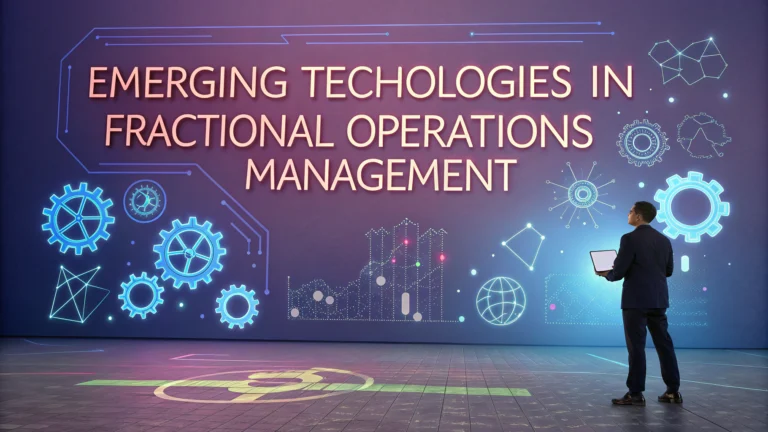Emerging technologies are reshaping how fractional executives manage operations, bringing new tools and capabilities to businesses of all sizes.
Modern fractional COOs now leverage AI, automation, and advanced analytics to deliver enterprise-level operational excellence to small and medium businesses.
This quick guide explores the key technologies transforming fractional operations management and how they benefit both fractional leaders and their client companies.
AI-Powered Operations Management Tools
Artificial intelligence platforms like Celonis and UiPath help fractional COOs quickly analyze and optimize business processes.
- Process mining tools to identify operational bottlenecks
- Predictive analytics for demand forecasting
- AI-assisted decision making frameworks
- Natural language processing for automated reporting
Cloud-Based Collaboration Solutions
Remote collaboration tools enable fractional executives to effectively manage distributed teams.
- Monday.com for project management
- Slack for team communication
- Zoom for virtual meetings
- Google Workspace for document collaboration
Automation and Integration Platforms
Modern automation tools help fractional COOs streamline workflows across multiple systems.
- Zapier for workflow automation
- Power Automate for Microsoft ecosystem
- Integromat for complex integrations
- Automate.io for business process automation
Data Analytics and Visualization
Advanced analytics tools provide fractional executives with real-time insights.
- Tableau for data visualization
- Power BI for business intelligence
- Looker for real-time analytics
- Sisense for embedded analytics
Supply Chain Management Technologies
Digital supply chain tools help fractional COOs optimize inventory and logistics.
- SAP Integrated Business Planning
- Oracle SCM Cloud
- Manhattan Associates
- Blue Yonder supply chain solutions
Implementing New Technologies: Best Practices
Start with a thorough assessment of current operations and identify specific pain points before selecting new tools.
- Begin with pilot programs to test effectiveness
- Ensure proper training and documentation
- Measure ROI through defined metrics
- Scale successful implementations gradually
Moving Forward with Technology Integration
Success with emerging technologies requires a balanced approach between innovation and practical implementation.
Connect with technology vendors and other fractional executives through platforms like Cerius Executives or Chief Outsiders to stay updated on the latest tools and best practices.
Remember that technology should enable better decision-making and operational efficiency, not create additional complexity in the organization.
Security and Compliance Tools
Modern fractional executives must ensure data protection and regulatory compliance across operations.
- Microsoft 365 Security Center
- Okta for identity management
- OneTrust for privacy compliance
- Qualys for vulnerability management
Performance Monitoring Systems
Real-time monitoring tools help fractional COOs maintain operational excellence.
- Datadog for infrastructure monitoring
- New Relic for application performance
- PagerDuty for incident response
- AppDynamics for business monitoring
Change Management Platforms
Digital tools support smooth technological transitions and organizational changes.
- ServiceNow for change management
- Whatfix for digital adoption
- WalkMe for user onboarding
- Pendo for product adoption
Empowering Tomorrow’s Operations Today
The technology landscape for fractional executives continues to evolve rapidly, offering increasingly sophisticated tools for operational excellence. Success depends on selecting the right combination of technologies that align with business objectives while maintaining simplicity and efficiency.
Focus on building a sustainable tech stack that can grow with your client organizations. Regularly evaluate new tools and platforms, but always prioritize solutions that deliver measurable value and support core business operations.
Stay connected with technology communities and continue education on emerging tools to maintain competitive advantage in the fractional executive space.
FAQs
- What is a fractional COO, and how does it relate to emerging technologies?
A fractional COO is a part-time executive who manages operations while leveraging modern technologies. They implement digital transformation strategies, automation solutions, and innovative operational processes on a flexible, as-needed basis. - How are AI and machine learning being integrated into fractional operations management?
AI and machine learning are being used for predictive analytics, process automation, resource allocation optimization, and decision support systems, enabling fractional COOs to make data-driven decisions and improve operational efficiency. - What role does cloud computing play in modern fractional operations?
Cloud computing enables fractional COOs to implement scalable solutions, remote workforce management tools, and integrated business systems while reducing infrastructure costs and improving accessibility to operational data and resources. - How are IoT devices transforming fractional operations management?
IoT devices provide real-time monitoring, data collection, and operational insights, allowing fractional COOs to optimize supply chains, manage inventory, and improve operational efficiency through connected systems and sensors. - What cybersecurity measures are essential for fractional operations in the digital age?
Essential measures include implementing multi-factor authentication, encrypted communication systems, secure cloud storage, regular security audits, and comprehensive data protection protocols across all operational technologies. - How are digital collaboration tools changing fractional operations management?
Digital collaboration platforms, project management software, and virtual meeting tools enable fractional COOs to effectively manage remote teams, coordinate cross-functional projects, and maintain operational continuity across different locations. - What role does blockchain technology play in modern fractional operations?
Blockchain technology is being utilized for supply chain transparency, smart contracts, secure record-keeping, and automated transaction processing, enhancing operational efficiency and trust in business relationships. - How are analytics and business intelligence tools evolving for fractional operations?
Advanced analytics tools now offer real-time dashboards, predictive modeling, and automated reporting capabilities, enabling fractional COOs to monitor KPIs, identify trends, and make informed operational decisions more effectively. - What emerging payment technologies are impacting fractional operations management?
Digital payment systems, cryptocurrency integration, and automated billing platforms are streamlining financial operations, improving cash flow management, and enabling more flexible payment options for clients and vendors. - How are robotic process automation (RPA) tools being implemented in fractional operations?
RPA tools are automating repetitive tasks, improving accuracy in data entry, streamlining workflow processes, and reducing operational costs while allowing fractional COOs to focus on strategic initiatives.







